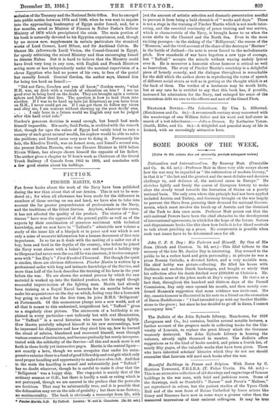FICTION.
PINCHER MARTIN, 0.D.*
FAR fewer books about the work of the Navy have been published during the war than about that of our Armies. This is not to be won- dered at ; for when all allowance has been made for the difference in numbers of those serving on sea and land, we have also to take into account the far greater preponderance of professionals in the Navy, and the traditions of the Silent Service. Anyhow, whatever the cause, it has not affected the quality of the product. The stories of " Bar- timeus " have won the approval of the general public as well as of the experts by their combination of generous sentiment with technical knowledge, and we now have in " Taffrail's " admirable new volume a study of the inner life of a bluejack et in peace and war which is not only a mine of accurate information but a human document of first-rate importance. In so far as it deals with the making of a sailor out of a boy, born and bred in the depths of the country, who before he joined the Navy went about with a baker's cart and beyond a holiday trip to Skegness had never seen the sea till he was nineteen, it invites compari- sons with " Ian Hay's " First Hundred Thousand. But though the spirit is similar, there are obvious differences. Pincher Marlin is written by a professional sailor with long and intimate knowledge of the Service, and more than half of the book describes the training of his hero in the year before the war. We are shown the normal process by which the raw material is worked up into the finished product, not the rapid though successful improvisation of the fighting man. Martin had already been training at a Royal Naval barracks for six months before we make his acquaintance on the day on which, feeling very like a homesick boy going to school for the first time, he joins H.M.S. ' Belligerent' at Portsmouth. Of this momentous plunge into a new world, and of all that it meant to this undersized, insignificant lad, " Taffrail " gives us a singularly clear picture. The microcosm of a battleship is ex- plained in every particular—not tediously but with real illumination, for " Taffrail " is a naval historian who wears his learning lightly. How Martin painfully adapted himself to his new surroundings, how he impressed his shipmates and how they sized him up, how he learned the ritual of salutes, blundered and recovered himself, went through various courses of instruction, and became gradually but surely interpene- trated with the solidarity of the Service—all this and much more is set forth in these lively yet instructive pages. Martin is the central figure— not exactly a hero, though we soon recognize that under his unim- pressive exterior there is a fund of good fellowship and real grit which only need proper handling and opportunity to make themrelves felt. And that in the main the handling is sound and substantially just " Taffrail " has no doubt whatever, though he is careful to make it clear that the `Belligerent' was a happy ship. The viv-point is mainly that of the ordinary seaman or O.D., but there is hardly a rank or rating which is not portrayed, though we are assured in the preface that the portraits are fictitious. That may be subitantially true, and it is possible that the delineation may err on the side of geniality ; but there is no flattery, no sentimentality. The book is obviously a transcript from life, with • Pincher Martin, O.D. By TalIraU. London : W. and B,. Chambers. M. ed. net.]
just the amount of artistic selection and dramatic presentation needful to prevent it from being a bald chronicle of " works and days." There is not a stage in the training of Pincher Martin which is not made inter- esting, and the essential continuity of peace training and war service, which is characteristic of the Navy, is brought home to us when the scene shifts to the Channel and the North Sea. Even in the most exciting passages—in the sinking of the Belligerent,' the rescue of the ' Monsoon,' and the vivid account of the share of the destroyer Mariner' in the battle of Jutland—the note is never forced to the melodramatic pitch. New standards of war have begotten a new type of courage, but " Taffrail " accepts the miracle without waxing unduly lyrical over it. He is moreover a humorist whose humour is critical as well as benevolent. The story of Pincher Martin's courtship is a delightful piece of homely comedy, and the dialogue throughout is remarkable for the skill which the author shows in reproducing the turns of speech of different social strata as well as in getting at the thought which is at the back of them. The verdict of a landsman may bo worth little, but at any rate he is entitled to say that this book has, if possible, increased his admiration for the Navy, and enlarged his sense of the tremendous debt we owe to the officers and men of the Grand Fleet.


































 Previous page
Previous page